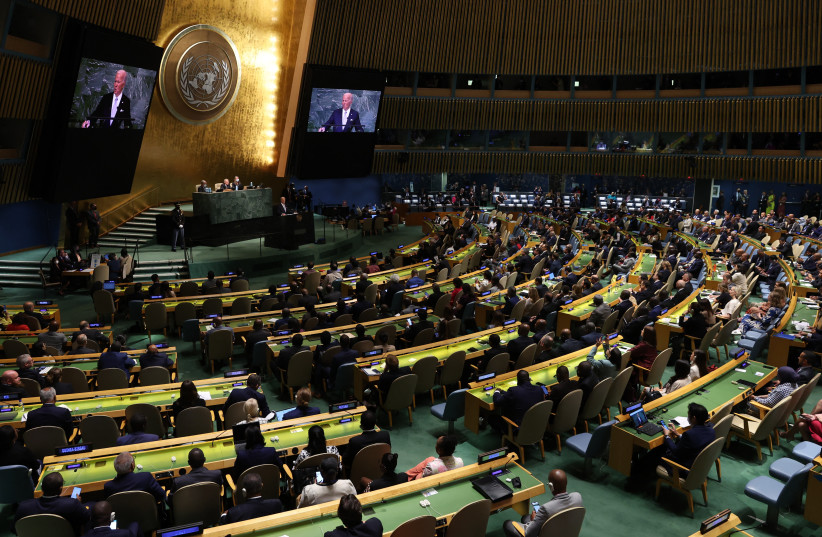Alarm bells went off in Israel after journalists in Prime Minister Yair Lapid’s delegation to the UN reported that he was planning to profess his support for a two-state solution in his address to the General Assembly on Thursday.
“There is no place and no logic in floating the idea of a Palestinian state,” said Alternate Prime Minister Naftali Bennett. “The year is 2022, not 1993. Even true friends of the State of Israel don’t expect us to compromise on our security and our future.”
Justice Minister Gideon Sa’ar warned that “establishing a terrorist state in Judea and Samaria will endanger Israel’s security. Most of the nation in Israel and its representatives will not allow it to happen.”
Likud accused Lapid of “wanting to establish a Palestinian state on the border of Kfar Saba, Netanya and Ben-Gurion Airport, and give over territory in our homeland to our enemies. For years [former prime minister Benjamin] Netanyahu managed to take the Palestinian matter off the world agenda and Lapid brought [Palestinian Authority President Mahmoud Abbas] to center stage in less than a year.”

Pop quiz: Who said the following?
“Ladies and gentlemen, I hear the buzz. I know that many of you have given up on peace, but I want you to know I have not given up on peace. I remain committed to a vision of peace based on two states for two peoples. I believe as never before that change is taking place in the Arab world today that offers a unique opportunity to advance that peace... I’m willing to negotiate to achieve that peace today.”
The answer: Not Lapid.
It was Netanyahu, at the UN, in 2016.
That was neither the first time nor the last that Netanyahu supported a two-state solution on the world stage. There was his 2009 speech at Bar-Ilan University, and most recently, his support for the Trump peace plan. While most of the attention was paid to the annexation part of the Trump plan, it included plans for a demilitarized Palestinian state – just like in Netanyahu’s Bar-Ilan speech.
Who leads this opposition?
It was not that long ago that this was a pretty common criticism of Netanyahu by parties to his Right. It was the kind of thing you would hear from the counterparts of Religious Zionist leader Bezalel Smotrich, such as National Union’s Ya’acov Katz or Uri Ariel a decade ago. They might throw in a video clip of Netanyahu shaking hands with Arafat for good measure. But now politicians in the right-wing bloc dare not say anything other than that Netanyahu is their infallible leader, lest they be cast out.
ONE OF THOSE right-wing outcasts is Sa’ar. His criticisms of Netanyahu were mostly about corruption and not about the Palestinian issue. Sa’ar, however, has a consistent record going back two decades of opposing territorial concessions, including as one of the Likud’s rebels who went against the faction to oppose the Gaza disengagement.
Still, me thinks Sa’ar doth protest too much. His bleating on Twitter about a “terror state in Judea and Samaria” means little after he threw all his political weight behind someone who supports just that.
Sa’ar decided to merge his list with that of Defense Minister Benny Gantz, now known as the National Unity Party (not to be confused with the aforementioned and defunct National Union). Gantz is on record as supporting a two-state solution, even if his preferred euphemism of late is that there will be a Palestinian “entity.” There can be differences of opinion within a party, but this seems like a very fundamental one that Sa’ar decided to swallow.
Bennett is a similar case. He has consistently opposed a Palestinian state and generally opposed even talking about the topic. Israel and the Palestinians should not be treated like “Siamese twins,” he has said behind closed doors.
How will other Israeli politicians approach this issue?
Bennett’s approach, going back to his entry into electoral politics a decade ago, was that if Israel presents itself as the Start-Up Nation or in any other positive way, international interlocutors will respond in kind. He did not mention the Palestinians once in his UN speech, focusing instead on Israeli solutions to corona, climate change, and other problems facing the world.
At the same time, Bennett and Lapid have been political partners for over a year. They were also political “brothers,” as they called themselves, in 2013-2015, so Lapid’s position could not have possibly come as a surprise to Bennett this week. And, of course, Bennett formed a coalition with several parties that support a two-state solution, not just Lapid’s Yesh Atid – though to begin with, Bennett did say his role was to block them from doing anything with those inclinations.
Lapid is at least being honest. He has supported a two-state solution for decades, including in his pre-political career as a newspaper columnist.
That he thinks this is the preferred outcome for the Israeli-Palestinian conflict is not something Lapid hid. He was a team player when Bennett was prime minister and therefore didn’t bring it up much. But when asked directly – and he was asked at almost every briefing he led as foreign minister – he always answered yes, he thinks there should be a two-state solution, and that Israel and the Palestinians need a full separation from one another. He also met with senior Palestinian Authority official Hussein al-Sheikh twice, to Bennett’s chagrin.
Either way, this whole situation is political. Lapid is not winning over any voters on the Right, so talking about two states will help him shore up votes on the Left. And he’s doing it in a UN speech timed to coincide with the evening news in Israel.
Sa’ar wants to win over right-wing voters to the National Unity Party and change the balance of the pro-Bibi and anti-Bibi blocs. Campaigning against a Palestinian state is Likud and Netanyahu’s bread and butter, and they all hope the public won’t remember their inconsistencies.
